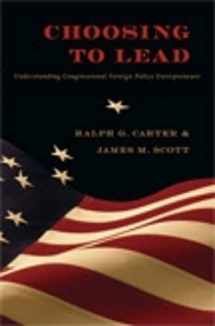
Choosing to Lead: Understanding Congressional Foreign Policy Entrepreneurs (New Slant: Religion, Politics, Ontology)
ISBN-13:
9780822344902
ISBN-10:
0822344904
Edition:
Illustrated
Author:
James M. Scott, Ralph G. Carter
Publication date:
2009
Publisher:
Duke University Press Books
Format:
Hardcover
312 pages
FREE US shipping
Book details
ISBN-13:
9780822344902
ISBN-10:
0822344904
Edition:
Illustrated
Author:
James M. Scott, Ralph G. Carter
Publication date:
2009
Publisher:
Duke University Press Books
Format:
Hardcover
312 pages
Summary
Choosing to Lead: Understanding Congressional Foreign Policy Entrepreneurs (New Slant: Religion, Politics, Ontology) (ISBN-13: 9780822344902 and ISBN-10: 0822344904), written by authors
James M. Scott, Ralph G. Carter, was published by Duke University Press Books in 2009.
With an overall rating of 4.5 stars, it's a notable title among other
books. You can easily purchase or rent Choosing to Lead: Understanding Congressional Foreign Policy Entrepreneurs (New Slant: Religion, Politics, Ontology) (Hardcover) from BooksRun,
along with many other new and used
books
and textbooks.
And, if you're looking to sell your copy, our current buyback offer is $0.51.
Description
Shedding new light on how U.S. foreign policy is made, Ralph G. Carter and James M. Scott focus on “congressional foreign policy entrepreneurs,” the often unrecognized representatives and senators who take action on foreign policy matters rather than waiting for the executive branch to do so. These proactive members of Congress have undertaken many initiatives, including reaching out to Franco’s Spain, promoting détente with the Soviet Union, proposing the return of the Panama Canal, seeking to ban military aid to Pinochet’s regime in Chile, pushing for military intervention in Haiti, and championing the recognition of Vietnam. In Choosing to Lead, Carter and Scott examine the characteristics, activities, and impact of foreign policy entrepreneurs since the end of the Second World War. In so doing, they show not only that individual members of Congress have long influenced the U.S. foreign policy-making process, but also that the number of foreign policy entrepreneurs has grown over time.Carter and Scott combine extensive quantitative analysis, interviews with members of Congress and their staff, and case studies of key foreign policy entrepreneurs, including Frank Church, William Fulbright, Jesse Helms, Edward Kennedy, Pat McCarran, and Curt Weldon. Drawing on their empirical data, the authors identify the key variables in foreign policy entrepreneurship, including membership in the Senate or House, seniority and committee assignments, majority or minority party status, choice of foreign policy issues, and the means used to influence policy. By illuminating the roles and impact of individual members of Congress, Carter and Scott contribute to a more nuanced understanding of the broader U.S. foreign policy-making process.


We would LOVE it if you could help us and other readers by reviewing the book
Book review

Congratulations! We have received your book review.
{user}
{createdAt}
by {truncated_author}


